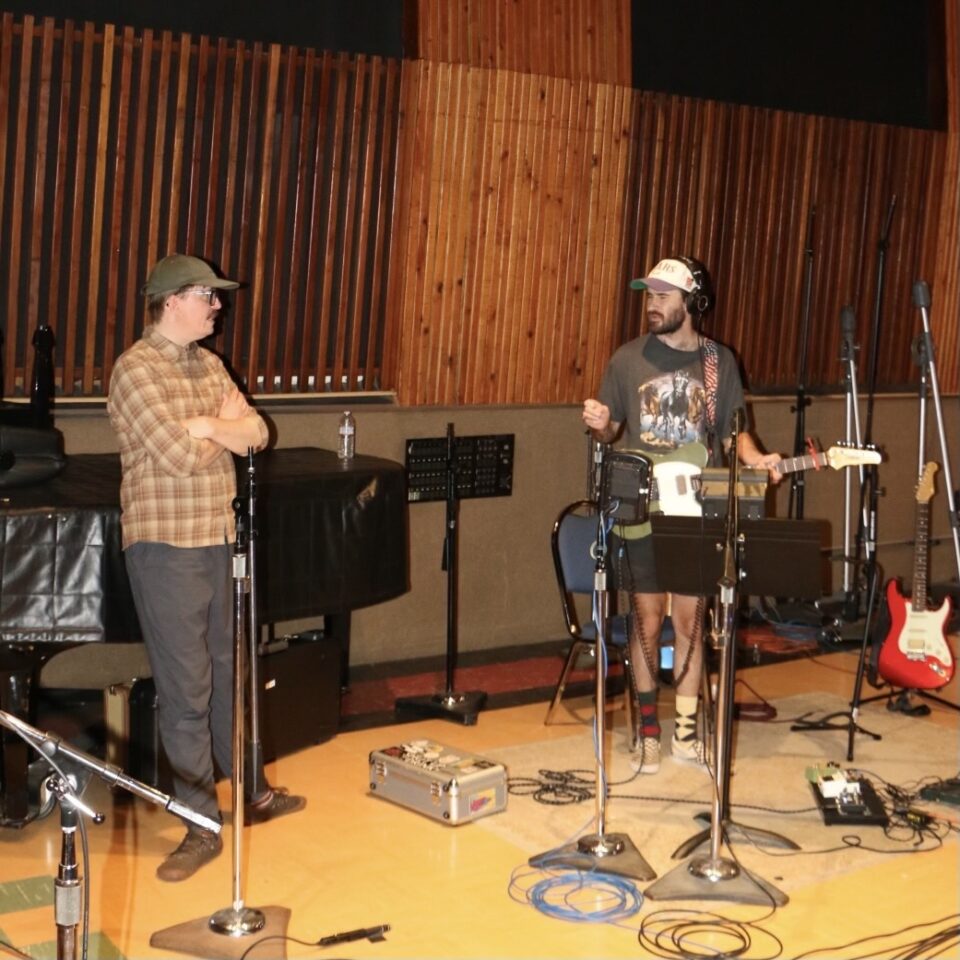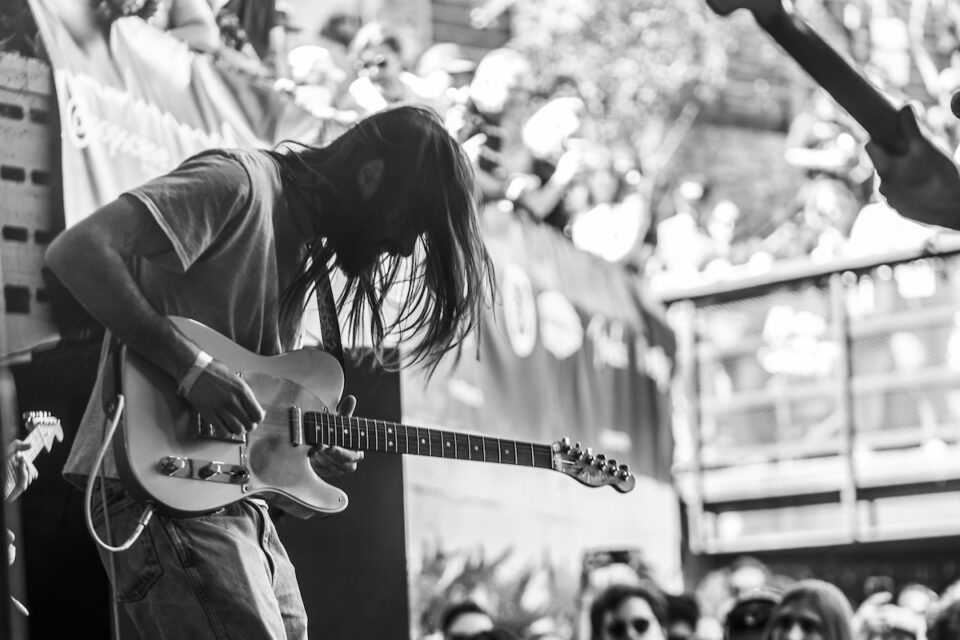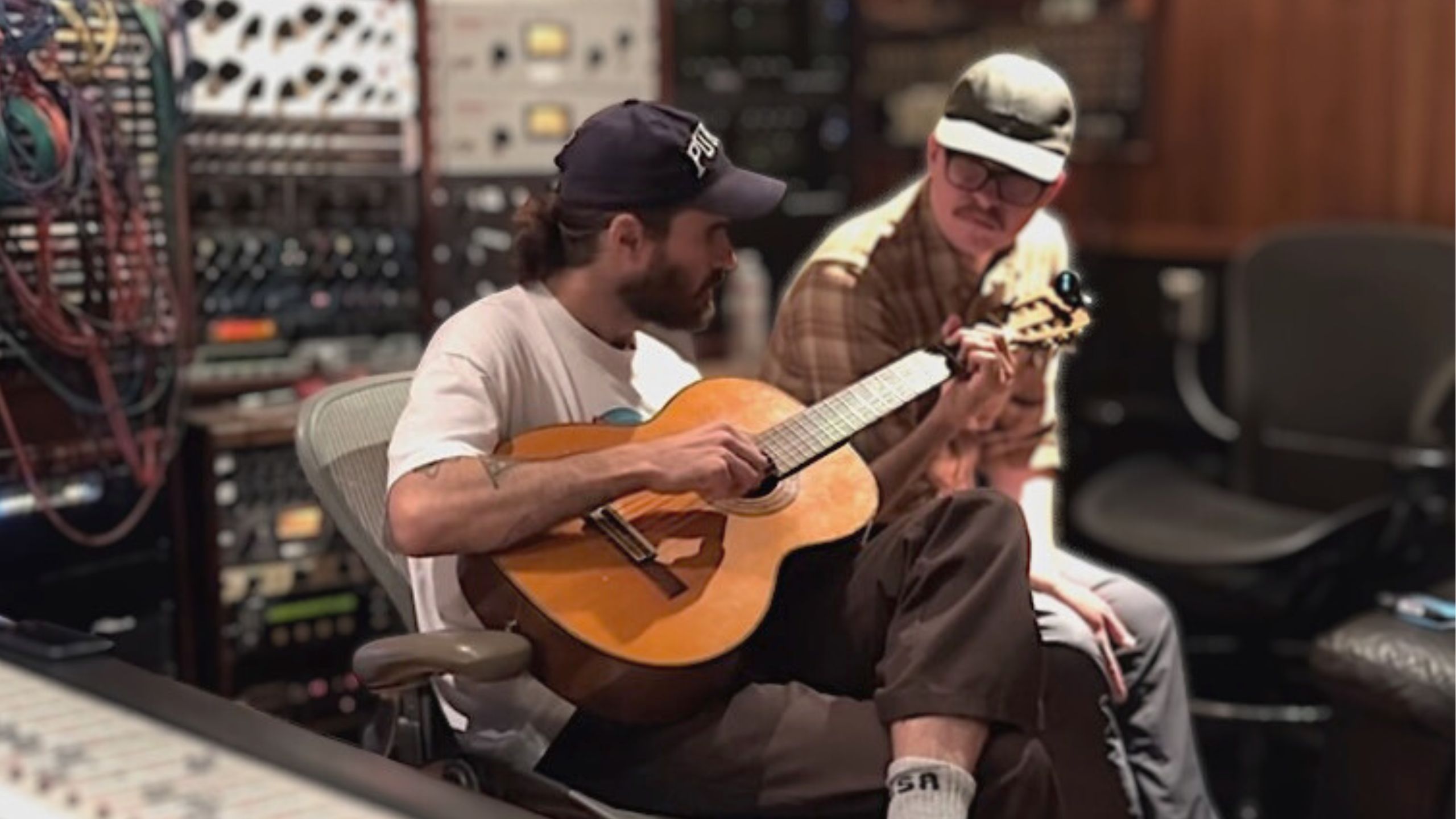When Petey USA began plotting his third album, he wasn’t doing much thinking at all. On tour in support of his sophomore record, USA, and exhausted from life on the road, he leaned on his Capitol Records team to get the ball rolling on LP3. When his label A&R suggested Petey make the album with Chris Walla, producer extraordinaire and former Death Cab for Cutie member, the new project suddenly snapped into focus. Petey returned to Los Angeles reinvigorated and ready to make his record, and after initial chats with Walla from his home in Norway, it became clear that the project would become a full-band record.
Across five weeks of recording, though, the album emerged as something else. Part live-band affair, part duet between Walla and Petey, part solo effort, The Yips emerged, as Walla explains, as a “patchwork quilt.” Perhaps the result of Petey and Walla’s nearly psychic chemistry, its miraculous how smoothly all these different aspects of the record work together. This is largely due to Petey’s specificity as a writer, his uncanny ability to speak from his own perspective and make those feelings universal. It’s a chronicle of people getting over the yips, but also a reflection of his state of mind at this point in his career.
We caught up with the artists from their respective homes to chat about how The Yips came to be.
Pete, when did you realize that you wanted to bring someone in to produce the record, and when did you realize that that person should be Chris?
Petey: I always want to work with a producer just to be able to wrangle in my process a little bit. I’m a very disorganized person and I don’t really trust my producer instincts in terms of knowing what to leave out. It’s always nice to have someone to just bounce ideas off of. Otherwise, I don’t think I’d really be able to get anything done, and I don’t really trust my technical ability too much in the studio as far as recording goes. It’s just nice to have a partner.
As far as working with Chris goes, I didn’t really have anyone in particular in mind. I didn’t ever imagine Chris would be interested. My label A&R cast a net and came back with some names. They knew I was a huge Death Cab fan, so when his name came up I was like, “Well, yeah, of course it’s him if he’s interested,” which was sort of trippy for me. It was a no-brainer: I’m the biggest fan of this guy, and he’s interested.
Chris, were you familiar with Pete’s work before being asked to do this project?
Chris Walla: I was, but I guess it was only a month or two before I got that A&R email that I’d stumbled into the Audiotree session. I was just becoming a fan, and then I got this really random cold email through my recording studio website. Pete and I talked for maybe 15 minutes and it was just really nice to hang out and it seemed like we had some stuff in common. Pete asked me how I produced my records, and I was like, “I don’t, man, I just do stuff ’til it’s done.” That sounded good to him. I’m so happy and so grateful that we did it because I love this record and I think it’s one of my favorite things I’ve ever worked on. I was really moved a lot of times while recording it, and that doesn’t always happen. I just felt something through the whole process.
Petey: When I was around an independent label, I felt like I had to take a lot more ownership of the creation of things—of who I worked with, what the sounds were, what the process was. If I didn’t control that, then it just wouldn’t happen, because I didn’t have other people in my world to tell me what was up. Signing to a major label, I think I wanted to relieve myself of that pressure to figure out the logistics of everything. This was a weird circumstance where I think I was on the road, I was really busy, and I sort of put this off. I was just like, “Y’all go find someone and we’ll figure it out.” For them to come back with Chris as a name, I was just reminded that I actually want things. I was like, “I needed someone to tell me, ‘Here’s your favorite producer and you can work with them.’” I didn’t have a thought in my brain about that before, which is so funny because it’s such a no-brainer.

Chris Walla and Petey in the studio
Does it allow you to take ownership back, even though you’re working with someone else?
Petey: I knew from the get-go that Chris has been guiding my musical instincts since I was 15. I was really, really aware of that. Right away I knew it was a situation where I could have him play instruments and he would understand the voicings—they’ll sound how I’ve always wanted them to sound. There’s a world in which it was the wrong day and Chris didn’t respond to the email and Sergio [Petey’s A&R] had reached out to someone else and it would’ve been the total wrong fit. I still would’ve been like, “Sure, I’m busy, I don’t want to think about this, let’s do it.” I don’t know how that would’ve turned out, but definitely not as cool.
Were most of the songs written when the process of making the record began?
Petey: I thought they were written, which is how I do everything. I think that my anxiety and my lack of faith leads me to come up with things, because I’m not a jammer. When there’s a transaction happening, I have to have everything on my end done—or at least I have to trick myself into thinking that it’s done—before I go in and spend money on something. This is an expensive and important thing, so we’re going to do this as quickly and as efficiently as possible. Of course it doesn’t happen like that, and it didn’t really happen like that, but that’s how I tried to set it up.
So we went in and I thought I had pretty much a finished album written, and through the process we slowly started patching up a ton of holes to the point where these songs ended up in a completely different place from where they started. At the end of what we thought was going to be the record, there was confusion on my end. I could tell there was some confusion on Chris’s end. There was some confusion on my manager’s end, and I think we knew the tracking was done, but I wrote one more song. And then I wrote four more, and then we recorded those four more, and those last four were strictly collaborative between me and Chris, really coming together in the studio. Those ended up being my four favorite songs on the album.
“My label A&R knew I was a huge Death Cab fan, so when [Chris’] name came up I was like, ‘Well, yeah, of course it’s him if he’s interested.’” — Petey USA
Walla: My first experience with the music was in this live rock band format, and that Audiotree session rules. My feeling was just like, “Well, shit, why don’t we just do that?” We started there and then as we got into it, as Pete and I got to know one another, and as I started to get a better perspective on the hits and his catalog and what the fans really go for, it started to feel like there was a different way to do it. So many of my favorite records I’ve worked on have been real patchwork quilts where they don’t necessarily come from a single brain space or a single session or a single group of musicians, and you’ve always got somebody right at the core who’s telling the story and holding your hand through the whole thing.
How did “the yips” come to be the defining theme of the album?
Petey: I’m a huge sports guy, so I’ve been hearing about it my entire life, and it was just something that kept on popping in my brain. The yips are something that happen during recording, especially when you’re just isolated in your headphones. It can be so neurologically confusing—when you’re dealing with frequencies, it’s just information overload coming into your headphones while you’re trying to memorize things. I was just thinking about the yips as they apply to life. A lot of these songs are about someone going through something and talking about it—or not talking about it—at a bar. The sort of cure for the yips in this world is having beers at this bar, just to try and set your head straight a little bit.

Chris, what’s your process for honoring the narrative themes that run through the record?
Walla: I wouldn’t say it’s very often that I have a dead clear idea of what I want something to sound like before it’s really gotten started. There are moments, lines, and things that happen—particularly on repeat listens—as the production blossoms. As you develop a relationship with it, as it’s coming through the speakers over and over again, there are lines that just push themselves to the front. I’m always fascinated by producers who feel like they always know—or at least they say they always know—what something should sound like, because so much of my process is simply learning the songs and ingesting them the way that I would a record that I love. I don’t feel great about it until I’ve learned it, until I’ve tried to steer all the stuff into the little emotional alleyways and spaces that I feel like they’re supposed to go into.
Pete, working with someone that you’ve idolized for so long, how do you stick up for your own artistic vision in the studio?
Petey: I always show up with the only thing that I know how to do: my synth lines. I just write my songs to a bedrock of arpeggiated synths. I know I’m not the strongest guitar player, but when I have played guitar, I’ve wanted to play guitar like Chris. Being able to hand something like that off, he was never asking to do it. He was trying to get me to do that. So it felt like he was honoring my vision from the get-go, and I was just looking forward to collaborating whenever he felt that it was necessary. That ended up working really well for me. I don’t feel like I gave up any of my vision, and so often I’m confused about what my vision is. That’s a cool thing about working with one of your idols, someone who’s taught you how to do shit. Nothing was a question.
“As Pete and I got to know one another, and as I started to get a better perspective on the hits and his catalog and what the fans really go for, it started to feel like there was a different way to do it.” — Chris Walla
Chris, what do you think makes Pete unique as a songwriter?
Walla: The reason I was so drawn to him is that Pete’s got such a sincere and deep desire to connect with people through listening, and listening through connection, and speaking and listening and connecting and receiving all at once. So many of the songs have this beautiful internal/external monologue thing happening. It’s really clear that this is a conversation happening inside someone’s head—there is no other person. Then, all of a sudden, there’s another person involved and there’s this dream-state quality about it. I love the idea of something that was private and internal being opened up and shared. The way Pete plays with the presentation of the voice for specific lines or parts of a story is so useful. Pete, you’re so good at it, and it just really makes all the stories bloom for me. FL







